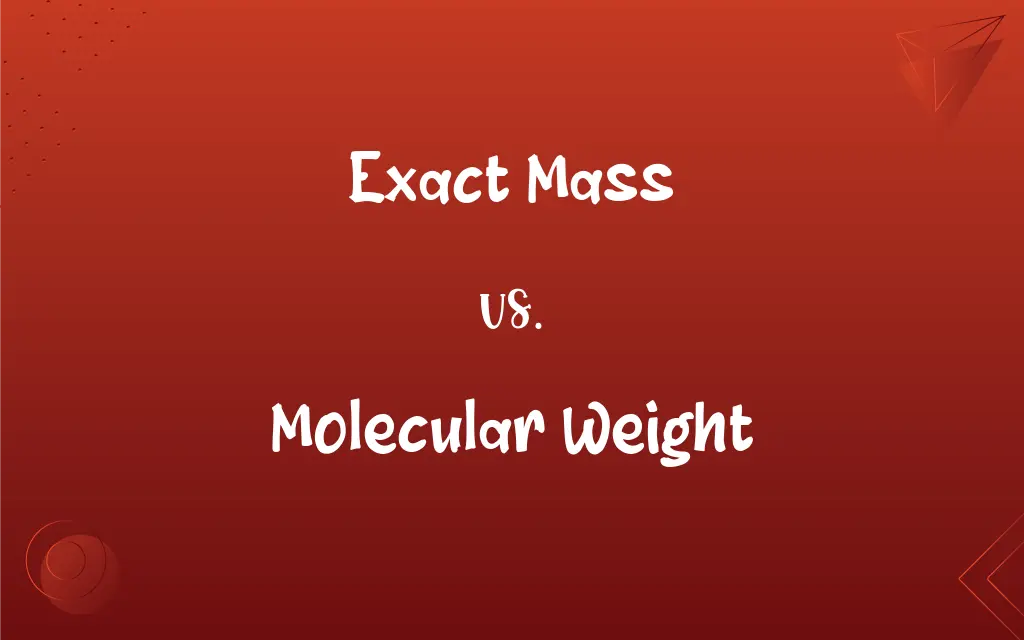Exact Mass vs. Molecular Weight: What's the Difference?
Edited by Aimie Carlson || By Janet White || Published on February 8, 2024
Exact mass is the precise mass of a molecule based on the exact atomic masses of its constituent isotopes, while molecular weight is the average mass of the molecule calculated using the average atomic masses of its elements.

Key Differences
Exact mass refers to the precise calculation of a molecule's mass using the exact masses of individual isotopes. It is a definitive value for a specific isotope composition. Molecular weight, however, is a statistical average that accounts for the varying natural abundance of different isotopes. It is less precise and used for general calculations.
Exact mass is crucial in high-precision scientific applications like mass spectrometry, where identifying and differentiating molecules based on tiny mass differences is essential. Molecular weight is often used in broader contexts like calculating amounts for chemical reactions, where exact isotopic composition is less critical.
Measuring exact mass requires sophisticated instruments like mass spectrometers, which can distinguish between isotopes. Calculating molecular weight is simpler and often done using periodic table values, averaging the atomic masses of the elements in a molecule.
In the chemical and pharmaceutical industries, exact mass is vital for identifying and characterizing compounds, especially in the development of new drugs. Molecular weight is more commonly used for bulk calculations, like determining the quantities of reactants and products in large-scale chemical processes.
In educational settings, molecular weight is often taught first due to its simplicity and practicality in basic chemistry. In advanced research, exact mass becomes more significant, particularly in fields like organic chemistry, biochemistry, and pharmacology.
ADVERTISEMENT
Comparison Chart
Definition
Precise mass based on specific isotopes
Average mass considering isotopic distribution
Precision
High precision, specific value
Less precise, average value
Measurement Method
Requires advanced instruments like mass spectrometers
Calculated using periodic table values
Importance in Applications
Crucial in identifying compounds in high-precision fields
Used for general calculations in chemistry
Role in Industry
Key in drug development and compound identification
More common in large-scale manufacturing and reactions
ADVERTISEMENT
Exact Mass and Molecular Weight Definitions
Exact Mass
Exact mass is the sum of the masses of the isotopes in a single molecule.
The exact mass of a water molecule (H₂O) is calculated by adding the masses of two hydrogen isotopes and one oxygen isotope.
Molecular Weight
Molecular weight is the total mass of a molecule calculated using the standard atomic weights of its elements.
In calculating the molecular weight of glucose, standard atomic weights of C, H, and O are used.
Exact Mass
Exact mass is the total mass of all the atomic nuclei and electrons in a molecule.
The exact mass of a benzene molecule is determined by the sum of its carbon and hydrogen atomic masses.
Molecular Weight
Molecular weight is the average mass of a molecule based on the average atomic masses of its constituent elements.
The molecular weight of water is calculated using the average atomic masses of hydrogen and oxygen.
Exact Mass
Exact mass is a molecule's mass calculated using the mass of the most abundant isotope of each element.
The exact mass of glucose considers the most abundant isotopes of carbon, hydrogen, and oxygen.
Molecular Weight
Molecular weight is a weighted average of the atomic masses of the atoms in a chemical formula.
The molecular weight of sodium chloride is derived from the average atomic masses of sodium and chlorine.
Exact Mass
Exact mass is the precise measurement of a molecule’s mass considering its unique isotopic composition.
In mass spectrometry, the exact mass of a peptide helps in its identification.
Molecular Weight
Molecular weight is an average value that approximates the mass of molecules in a substance.
The molecular weight of a protein is estimated based on the average atomic weights of its amino acids.
Exact Mass
Exact mass reflects the actual atomic mass of each atom in a molecule based on isotopic abundance.
The exact mass of carbon dioxide includes the specific isotopes of carbon and oxygen present.
Molecular Weight
Molecular weight represents the sum of the average atomic weights of each atom in a molecule.
The molecular weight of ethanol takes into account the average weights of carbon, hydrogen, and oxygen.
Molecular Weight
Alternative spelling of molecular weight
FAQs
How is exact mass calculated?
By adding the exact masses of each isotope present in the molecule.
How is molecular weight determined?
By summing the average atomic masses of the elements in the molecule.
What is molecular weight?
The average mass of a molecule calculated using the average atomic masses of its elements.
What role does exact mass play in drug development?
It helps in accurately identifying and characterizing pharmaceutical compounds.
What is exact mass?
The precise mass of a molecule based on the exact atomic masses of its constituent isotopes.
Why is exact mass important in mass spectrometry?
It allows for precise identification and differentiation of molecules based on tiny mass differences.
Is molecular weight always an average value?
Yes, it's an average based on the natural abundance of element isotopes.
How does molecular weight assist in large-scale chemical processes?
It's used for bulk calculations in manufacturing and processing.
Can exact mass vary for the same molecule?
Yes, if the isotopic composition of the molecule changes.
Do chemists use both exact mass and molecular weight?
Yes, depending on the precision required for their work.
Is molecular weight used in chemical reactions?
Yes, it's used to calculate reactant and product amounts in reactions.
Why is molecular weight important in education?
It's a fundamental concept in teaching basic chemistry principles.
Is exact mass more precise than molecular weight?
Yes, exact mass provides a specific value based on isotopes.
Is molecular weight relevant in everyday products?
Yes, in things like food additives, pharmaceuticals, and chemicals.
Can exact mass be the same as molecular weight?
Rarely, if the molecule consists of only one isotope of each element.
Which industries rely heavily on exact mass measurements?
Pharmaceutical, biochemical, and organic chemistry industries.
Is molecular weight sufficient for all chemical calculations?
For most general calculations, yes, but not for high-precision needs.
How does isotopic abundance affect molecular weight?
It influences the average atomic mass of elements in the molecule.
Can exact mass be used in identifying unknown substances?
Yes, particularly in fields like forensic science and environmental testing.
How has technology improved exact mass determination?
Advanced instruments like mass spectrometers have increased precision and accuracy.
About Author
Written by
Janet WhiteJanet White has been an esteemed writer and blogger for Difference Wiki. Holding a Master's degree in Science and Medical Journalism from the prestigious Boston University, she has consistently demonstrated her expertise and passion for her field. When she's not immersed in her work, Janet relishes her time exercising, delving into a good book, and cherishing moments with friends and family.
Edited by
Aimie CarlsonAimie Carlson, holding a master's degree in English literature, is a fervent English language enthusiast. She lends her writing talents to Difference Wiki, a prominent website that specializes in comparisons, offering readers insightful analyses that both captivate and inform.































































